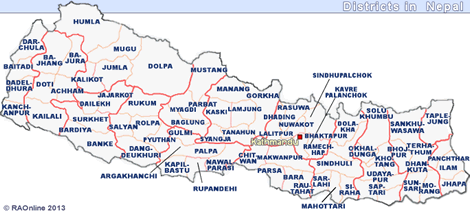|
Reports
on Nepal's Civil War
|
  
|
Maoist
deal to sideline Nepal's king
|
March
2005
A
new deal in the offing between Nepal's main political parties and Maoist
rebels has the potential not only of returning the Himalayan kingdom to
democracy but also ending a constitutional monarchy that has so far enjoyed
New Delhi's support.
Last
weekend, representatives of Nepali Congress, Nepali Congress (Democratic),
Nepal Communist Party (United Marxists-Leninists) or UML, People's Front
Nepal Party and the Nepal Sadbhavana Party meeting in Bangkok issued a
joint call to redraft the country's constitution through a constituent
assembly and force the ouster of King Gyanendra who seized power in a royal
coup on February 1.
"This
move poses the biggest challenge yet to Nepal's monarchy as well as to
Indian policy on Nepal," S D Muni, India's most-respected expert on South
Asian affairs and professor at the prestigious Jawaharlal Nehru University
told IPS.
 |
Full
story ... |
|
Nepal
'near humanitarian abyss'
|
March
2005
| Access
to humanitarian and medical supplies |
Nepal
is on the brink of a humanitarian crisis, the United Nations and international
agencies have warned. Conflict between security forces and Maoist guerrillas
has left civilians and refugees exposed and often cut off from aid supplies
and medical help. In a statement, the UN, European Union and nine Western
aid agencies urged both sides to respect human rights. Nepal's government
said the criticism was misplaced, and that it was overcoming the Maoist
blockades.
Nepal's
King Gyanendra imposed emergency rule in February, seizing absolute power
and curbing freedoms. Since then rebels have intensified attacks.
"The
United Nations and bilateral donor agencies in Nepal urge all parties to
ensure that movement of supplies and vehicles intended to alleviate the
suffering of civilian populations are not restricted," the statement says.
It goes on to list in stark terms the difficulties facing Nepalese civilians
caught up in the ongoing conflict.
Insecurity,
armed activity and Maoist blockades are pushing Nepal towards the abyss
of a humanitarian crisis
UN
and donors statement
According
to the organisations, Nepalese are often denied access to humanitarian
and medical supplies because of security roadblocks set up by Maoists.
 |
Full
story ... |
February
2005
| Wandering
aimlessly across Nepal without a destination |
Six
Maoists had spent the night at the homes of villagers. On a tipoff, an
army patrol from Chautara headquarter, led by Capt Keshab Shahi and another
unit from Panchkhal converged and surrounded Thulo Sirubari. By the time
the soldiers went house-to-house, the six district-level Maoist leaders
who had sheltered in the village had fled. The army rounded up seven villagers,
beat them up as they were led away into the Rolpakha community forest.
 |
Full
story ... |
 |
Road
closed
(February
2005) - external link
|

|
Nepali
Times
|
|
Maoists
talk tough amid blockade
|
February
2005
| The
rebels' demands were being refocused |
Soldiers
rescue a bus passenger wounded when Maoists opened fire on a passenger
bus on the Prithbi Highway at Beni Ghat on Sunday. The man was later flown
to the army hospital in Chhauni by helicopter.
On
16 February we left Kathmandu for our destination: Tehrathum in eastern
Nepal. After six days, we were forced to backtrack 1,000 km across Nepal
to Butwal. There, we stopped because finally we could go no further.
We
avoided the Prithbi Highway by taking the unconventional route to Hetauda
via Dakhsinkali. At Kulekhani, an army sentry told us we were the only
car he'd seen that day. The Tribhuban Highway in Bhainse was empty. There
were some motorcycles in Hetauda but no cars.
The
next morning, we passed a convoy of 50 tankers and trucks escorted by an
army mine-protected vehicle. At Patlaiya junction, we were waved on at
the checkpoint: only press and ambulances were being allowed unescorted.
 |
Full
story ... |
|
'Six
armed Maoists killed in encounter'
|
January
2005
| Newspaper
headlines don't distinguish between hardcore rebels and villagers forced
into the militia |
Six
Maoists had spent the night at the homes of villagers. On a tipoff, an
army patrol from Chautara headquarter, led by Capt Keshab Shahi and another
unit from Panchkhal converged and surrounded Thulo Sirubari. By the time
the soldiers went house-to-house, the six district-level Maoist leaders
who had sheltered in the village had fled. The army rounded up seven villagers,
beat them up as they were led away into the Rolpakha community forest.
 |
Full
story ... |


|



